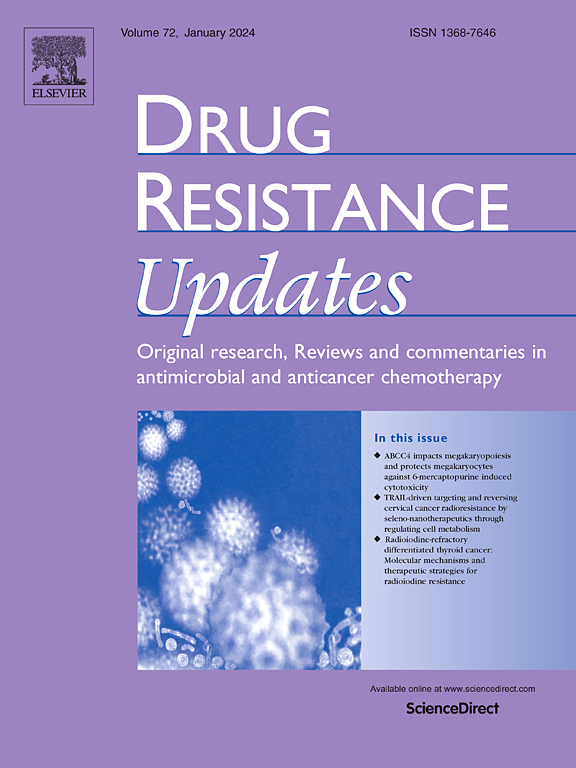IF 15.8
1区 医学
Q1 PHARMACOLOGY & PHARMACY
引用次数: 0
摘要
甲氨蝶呤(MTX)是治疗各种儿科疾病的重要抗代谢药物,包括急性淋巴细胞白血病(ALL)、非霍奇金淋巴瘤(NHL)、脑肿瘤、骨肉瘤、炎性肌纤维瘤(IMT)、幼年硬皮病(JS)和幼年特发性关节炎(JIA)。MTX 是一种叶酸拮抗剂,它能抑制二氢叶酸还原酶(DHFR),这是合成四氢叶酸所必需的一种酶。这种破坏会损害 DNA 合成、修复和细胞复制,尤其会影响快速分裂的细胞。尽管MTX疗效显著,但耐药性也带来了巨大的挑战,尤其是在儿科肿瘤领域,耐药性会影响持续治疗效果,导致疗效下降和预后不良。MTX耐药的机制包括MTX代谢关键酶活性降低、外排转运体表达增强、基因变异和信号通路改变。为克服MTX耐药性,人们探索了多种策略。研究人员研究了生姜提取物、金纳米粒子和三氧化二砷(ATO)的联合疗法,以增强 MTX 的细胞毒性作用。在 ALL 中,mTOR 抑制剂和 MDM2 抑制剂的协同作用提高了治疗效果。在JIA中,靶向ATP结合盒(ABC)转运体和调节转化生长因子-β(TGF-β)信号通路已成为很有前景的方法。对于骨肉瘤,强调自噬途径和影响化疗敏感性的非编码RNA可提高MTX的疗效。本综述阐述了MTX的治疗作用,阐明了其耐药机制,并讨论了管理MTX耐药的现有和潜在策略,以提高儿科肿瘤和其他疾病的治疗效果。这一知识库可为进一步研究和开发个性化治疗提供基础,从而优化MTX的临床疗效。本文章由计算机程序翻译,如有差异,请以英文原文为准。
Methotrexate resistance and its regulatory mechanisms in pediatric tumors and beyond
Methotrexate (MTX) is a critical antimetabolite drug in treating various pediatric diseases, including acute lymphoblastic leukemia (ALL), non-Hodgkin lymphoma (NHL), brain tumors, osteosarcoma, inflammatory myofibroblastic tumor (IMT), juvenile scleroderma (JS), and juvenile idiopathic arthritis (JIA). MTX acts as a folate antagonist by inhibiting dihydrofolate reductase (DHFR), an enzyme essential for the synthesis of tetrahydrofolate. This disruption impairs DNA synthesis, repair, and cellular replication, particularly affecting rapidly dividing cells. Despite its efficacy, MTX resistance poses significant challenges, particularly in pediatric oncology, where it undermines the ability to achieve sustained therapeutic effects, resulting in reduced therapeutic efficacy and poor prognosis. The mechanisms of MTX resistance encompassed reduced enzyme activity pivotal for MTX metabolism, enhanced expression of efflux transporters, genetic variations, and alterations in signaling pathways. Multifaceted strategies have been explored to overcome MTX resistance. Combination therapies with ginger extract, gold nanoparticles, and arsenic trioxide (ATO) have been investigated to augment MTX’s cytotoxic effects. Synergies with mTOR inhibitors and MDM2 inhibitors have demonstrated enhanced outcomes in ALL. In JIA, targeting ATP-binding cassette (ABC) transporters and modulating transforming growth factor‑β (TGF-β) signaling pathways have emerged as promising approaches. For osteosarcoma, emphasis on autophagy pathways and non-coding RNAs influencing chemotherapy sensitivity could enhance MTX effectiveness. This review delineates MTX's therapeutic roles, elucidates its resistance mechanisms, and discusses current and potential strategies for managing MTX resistance to bolster treatment effectiveness in pediatric tumors and other diseases. This knowledge base could underpin further research and development of personalized treatments to optimize MTX's clinical benefits.
求助全文
通过发布文献求助,成功后即可免费获取论文全文。
去求助
来源期刊

Drug Resistance Updates
医学-药学
CiteScore
26.20
自引率
11.90%
发文量
32
审稿时长
29 days
期刊介绍:
Drug Resistance Updates serves as a platform for publishing original research, commentary, and expert reviews on significant advancements in drug resistance related to infectious diseases and cancer. It encompasses diverse disciplines such as molecular biology, biochemistry, cell biology, pharmacology, microbiology, preclinical therapeutics, oncology, and clinical medicine. The journal addresses both basic research and clinical aspects of drug resistance, providing insights into novel drugs and strategies to overcome resistance. Original research articles are welcomed, and review articles are authored by leaders in the field by invitation.
Articles are written by leaders in the field, in response to an invitation from the Editors, and are peer-reviewed prior to publication. Articles are clear, readable, and up-to-date, suitable for a multidisciplinary readership and include schematic diagrams and other illustrations conveying the major points of the article. The goal is to highlight recent areas of growth and put them in perspective.
*Expert reviews in clinical and basic drug resistance research in oncology and infectious disease
*Describes emerging technologies and therapies, particularly those that overcome drug resistance
*Emphasises common themes in microbial and cancer research
 求助内容:
求助内容: 应助结果提醒方式:
应助结果提醒方式:


